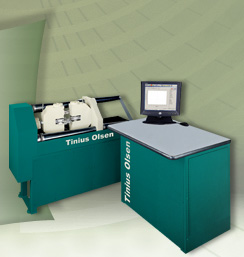Horizontal Tensile Testers

For maximum tensile testing throughput and capability, Tinius Olsen offers a range of horizontal tensile testing machines in capacities of 5 kN (1,000 lbf), 25kN (5,000 lbf), 150 kN (30,000 lbf) and 300kN (60,000 lbf).
Our horizontal testing machines offer unique benefits over vertically oriented testers by allowing a range of accessories to be mounted next to the machine that can turn the machine into a fully automatic testing station. These horizontal machines are designed primarily for production departments and are typically in constant use, however, the grips can be modified to accommodate different shaped samples and alternate grips can be provided for customers to interchange as and when their test requirements change.
The unique horizontal extensometer that is typically supplied incorporates pneumatic controls that automatically lowers the arms prior to the test and raises the arms at the end of the test. Friction free air bearings on the extensometer provide accurate strain measurement through fracture.
The combination of the machine and accessory design provides simple yet sophisticated operation, accurate and repeatable specimen placement against mechanical stops, automatic clamping, extensometer lowering (if supplied), testing, extensometer removal and grip return to the starting position, all with a single button operation.
The already sophisticated but simple operation can be further developed when the pc based machine control software provided with the machine is upgraded to include data acquisition and data analysis. This upgraded software is scalable and can interact with corporate enterprise software.
Further automation can then be achieved by the addition of a robot and sample racks. In this configuration, the robot will pick a sample from a sample rack and insert it into the machine grips and will then wait for the end of test so that the broken sample pieces can be removed from the grips and placed in a suitable disposal bin.
If a sample measuring station and bar code reader are included with the system, the whole testing process is automated with the only operator requirement being the loading of the samples in the sample rack. Additionally, the system can be programmed so that additional tests, such as a hardness test, can be performed on the specimens prior to performing the tensile test.
The test data that is generated can be included into corporate manufacturing and resource planning software ensuring that quality control data is an integral part of operations and allowing, in a hypothetical example, shipping departments to ship material complete with a quality certificate in real time immediately after the material has been tested.